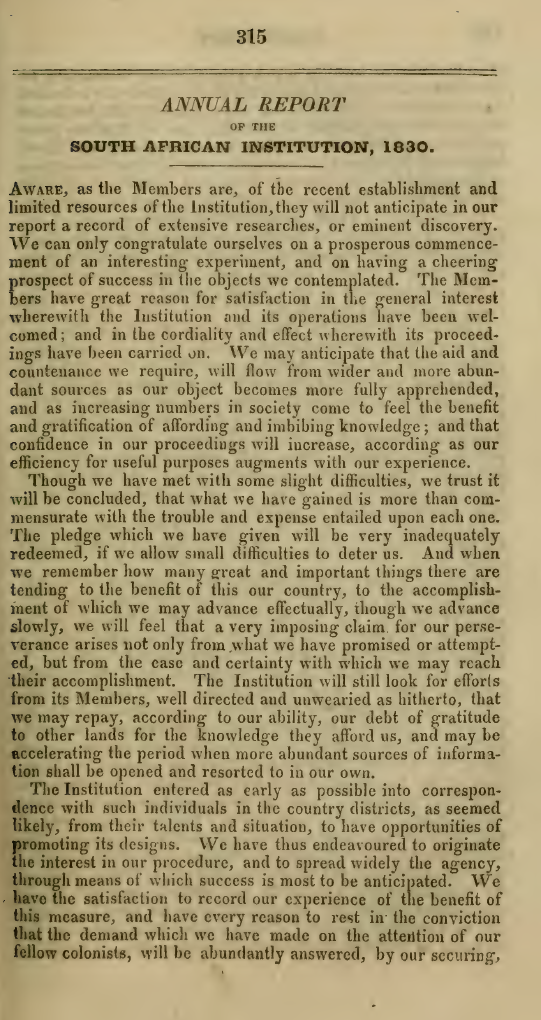Annual Report of the South African Institution, 1830
DOI:
https://doi.org/10.21504/saqj.13.2655Keywords:
South African Institution, South African Institution -- Annual Report 1830, Scientific Society, Colonial science, 19th-Century Natural History, Cape Colony -- organisations, Cape Colony, 19th-century zoology, Minerals, Conchology, 19th-century botany, GeologyAbstract
This is the Annual Report of the South African Institution for 1830, summarising its initial year of operations, limited resources, and future prospects. The Institution expresses satisfaction with its successful commencement, the general interest generated, and the cordiality of its proceedings, despite some minor difficulties. Its primary goal is to investigate the Geography, Natural History, and General Resources of South Africa.
Key activities and results detailed in the report include:
-
Correspondence and Agency: The Institution established contact with talented individuals in country districts to gather information from intelligent observers across the extensive South African domain.
-
Publications: Transactions are recorded in the South African Quarterly Journal to diffuse knowledge.
-
Incentives: An early effort to propose honorary premiums for communications was unsuccessful, leading the Council to award two medals instead.
-
Mechanical Arts: A medal was voted to Mr Naude for his ingenious model of a carriage utilising large rolling casks, which significantly reduces axle friction compared to common wagons, especially on railroads.
-
Scientific Investigation:
-
Statistics/Surveying: Efforts are underway to collect data on streams, elevations, and mountain ranges, underscoring the need for meteorological and surveying instruments.
-
Geology: New notices suggest the extensive presence of Transitional rocks (lower fossiliferous series), different from the characteristic primitive granites, encouraging further detailed investigation of the strata.
-
Botany: Efforts focused on practical results, including a local flora outline and the culture of exotics. A medal was awarded to Mr Bowie for useful notices on this subject. The Council is enthusiastic about establishing its own Experimental and Systematic Garden.
-
Zoology/Museum: This department shows the most progress, with significant advances toward a local Fauna (led by Dr Smith's research). The Institution received a major mark of favour through the transfer of the Government Museum and the temporary attachment of private collections (Dr Smith, Mr. von Ludwig, Mr Verreaux), leading to a rich collection, particularly in Ornithology and Quadrupeds.
-
The report concludes by asserting that the Institution's focus has been on developing the practical applications of science rather than expanding its boundaries, aiming to render fruitful the tract they supervise. The ultimate success is stated to rely on the continued efforts of its members, emphasising that the intrinsic reward lies in the mind's enrichment and expansion through the pursuit of knowledge.
Downloads

